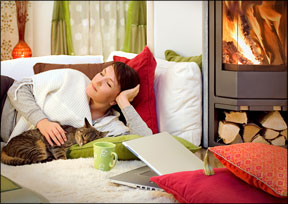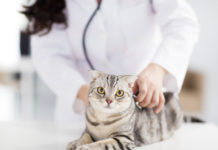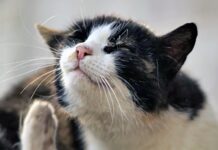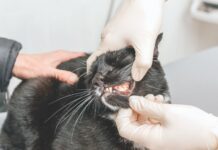Dear Elizabeth, I was sitting on the couch with my cat watching the news last night and, as usual, her purring nearly drowned out the reporter! I stopped thinking about the news and started wondering about purring. I remember reading something about people having their blood pressure lowered by a purring cat. What can you tell me about your motor? I have been purring nearly my whole life so I should be an expert! However, like many feline characteristics, purring is mysterious – even to me! Let me share what my friends at the Cornell Feline Health Center have to say about purring. At its core, purring is a means of communication – but cats purr in a variety of situations: when they are comfortable and content, of course, but also when they are anxious, injured or ill. What, exactly, a cat is communicating in these various situations is open to interpretation. The most straightforward purring is done by baby kittens. Starting at about two days of age, kittens purr in the presence of their mother, and in response to nursing. This early purring is likely to be an Im OK signal to the queen, and along with kneading 288 movement of the front paws on the mammary gland area, may serve as a stimulus for milk letdown. 
As kittens mature, purring continues in the presence of humans; this is one piece of evidence used by those behaviorists who suggest that cats think of their human friends as mother figures. You may know a cat who does more than purr in the presence of its human mother – some also knead their humans during times of contended interaction. Ive even known cats who drool as their humans pet them, as if they are remembering nursing!
This idea of cats purring in the presence of their stand-in moms would explain why cats purr when contended and happy – just as they did when they were kittens with their real, furry moms. More difficult to explain is the observation made by many veterinarians and cat owners that purring also occurs when a cat is anxious or fearful. Hmm … behaviorists have some ideas but dont really understand the purpose of purring in these situations. One idea is that the anxious cat purr may be similar to a humans nervous smile. Another idea is that cats purr to calm themselves. As you wrote in your question, it is known that humans show lowered blood pressure and a sense of well-being when in contact with a purring cat; perhaps the cat benefits, too!
Finally there is the question of HOW cats purr. Another mystery, Im afraid, but there is good evidence that purring emanates from the larynx, or voice box. Electromyographic studies have revealed that the vocal folds vibrate at set frequencies during purring. During respiration, oscillation of the laryngeal soft tissue structures results in turbulent airflow. Scientists term the audible result of this turbulent airflow a tonal buzz, but the rest of us call it … purring! Love, Elizabeth



